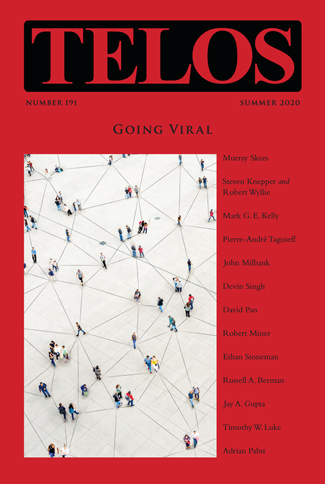By B. Venkat Mani · Friday, March 5, 2021 To read more in depth from Telos, subscribe to the journal here.
On February 2, the second day of Black History Month, a tweet from a Black woman in the United States unleashed a war of words in India, with global resonance. Rihanna, the Barbados-born U.S. singer, entrepreneur, philanthropist, and cultural activist posted a one-liner: “why aren’t we talking about this?!” with the hashtag #FarmersProtest and a link to a report about the government of India shutting down internet services in areas bordering the national capital, New Delhi, where farmers have been carrying out a movement to oppose three contentious farm laws.
Rihanna’s tweet went viral. The climate activist Greta Thunberg, Hollywood actor John Cusack, U.S.-based lawyer and supporter of Black Lives Matter Meena Harris, former adult star Mia Khalifa, Instagram influencer Amanda Cerny, R&B singer Jay Sean, and music composer Dr. Zeus all expressed support for the Indian farmers’ protests in their own independent tweets. Kisan Ekta Morcha, the official twitter account of the United Farmers’ Front, thanked Rihanna for her support of the movement, and countless Indians praised her for drawing international attention to the movement.
Continue reading →
By Telos Press · Tuesday, November 24, 2020 In today’s episode of the Telos Press Podcast, Camelia Raghinaru talks with Murray Skees about his article “Grab Them by the Public: Trump, Twitter, and the Affective Politics of Our Fragmented Democracy,” from Telos 191 (Summer 2020). An excerpt of the article appears below. If your university has an online subscription to Telos, you can read the full article at the Telos Online website. For non-subscribers, learn how your university can begin a subscription to Telos at our library recommendation page. Purchase a print copy of Telos 191 in our online store.
Listen to the podcast here.
Continue reading →
By David Pan · Monday, June 15, 2020 Telos 191 (Summer 2020): Going Viral is now available for purchase in our store. Individual subscriptions to Telos are also available in both print and online formats.
 While “going viral” has taken on a new meaning by recuperating an old one, it is the virtual experience that seems to be more enduring. Not only has the pandemic sped up the shifting of human activity onto virtual platforms, but the viral dynamics of social media seem set to outlast the microbial versions: it has turned out to be easier to lock down the Wuhan virus than President Trump’s Twitter feed. Yet in both cases, it is unclear whether it is the actual spread or the fear that is the greater danger. For this fear leads to the call for more authoritarian measures, whether this means censoring Twitter posts or locking down the population. But if viral spread leads to the reassertion of sovereignty, we also come to realize that the freedoms we have taken for granted are in fact the result of a curated space, in which the rules for interaction have always formed the hidden framework within which our lives have unfolded. As these framing conditions come into focus during the crisis, we have the opportunity to reimagine them in such a way as to retrieve sovereignty not as a kind of authoritarian reaction but as an understanding of how our values must inform the boundaries we set. This issue of Telos considers how the experience of going viral has come to dominate our political life as well as how our reflection on this process can free us to consider the alternatives. While “going viral” has taken on a new meaning by recuperating an old one, it is the virtual experience that seems to be more enduring. Not only has the pandemic sped up the shifting of human activity onto virtual platforms, but the viral dynamics of social media seem set to outlast the microbial versions: it has turned out to be easier to lock down the Wuhan virus than President Trump’s Twitter feed. Yet in both cases, it is unclear whether it is the actual spread or the fear that is the greater danger. For this fear leads to the call for more authoritarian measures, whether this means censoring Twitter posts or locking down the population. But if viral spread leads to the reassertion of sovereignty, we also come to realize that the freedoms we have taken for granted are in fact the result of a curated space, in which the rules for interaction have always formed the hidden framework within which our lives have unfolded. As these framing conditions come into focus during the crisis, we have the opportunity to reimagine them in such a way as to retrieve sovereignty not as a kind of authoritarian reaction but as an understanding of how our values must inform the boundaries we set. This issue of Telos considers how the experience of going viral has come to dominate our political life as well as how our reflection on this process can free us to consider the alternatives.
Continue reading →
|
|



